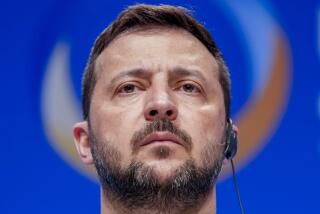Private Citizen Yeltsin Visits the Holy Land
- Share via
JERUSALEM — Making his first trip abroad since his abrupt resignation last week, former Russian President Boris N. Yeltsin visited Israel and the Palestinian territories Thursday, telling reporters that he was settling in “gradually” to his new life as a private citizen.
But little adjustment seemed to be necessary: Yeltsin, who is traveling with an entourage that includes top Russian officials, scores of journalists, his family, doctor and cook, was accorded all the pomp, honor and aggressive security detail of a visiting head of state.
And a spokesman explained to reporters that Yeltsin should not be referred to as a former president but as Russia’s first president. “He’s the president and will always be,” said Dmitri D. Yakushkin. “It’s a sign of honor for him.”
Appearing pale but relaxed and cheerful, the 68-year-old Yeltsin was greeted with honor guards, trumpets and toasts at a friendly lunch in Jerusalem with Israeli President Ezer Weizman and at a Bethlehem dinner hosted by Palestinian Authority President Yasser Arafat.
After accepting a religious award from Jerusalem’s Greek Orthodox Church leaders, Yeltsin was the first speaker at the ceremony that followed--despite the presence of the presidents of Greece, Georgia, Belarus, Ukraine and Moldova. All six are in the Holy Land to celebrate Orthodox Christmas today.
Yeltsin spoke out during the day on issues ranging from Palestinian statehood to the controversial war that Russia is fighting in the separatist republic of Chechnya. He also referred briefly to his decision to step down Dec. 31, saying his soul had been “in pain for the simple people of Russia.” He didn’t elaborate.
Regarding Chechnya, Yeltsin predicted that the war, which began in September, would last at most “two more months.”
“Then we will plant our Russian flag in Chechnya,” he declared during a visit to the ornate Greek Orthodox patriarchate in Jerusalem’s Old City. Eastern Orthodoxy is divided into 15 churches, along ethnic and national lines.
At a later stop, Yeltsin added that Russia’s war is not with the Chechen people. He said the aim of his government, and that of his successor, Acting President Vladimir V. Putin, is to protect the civilian population in Chechnya from the rebels, people he described as “terrorists.”
Israeli Interior Minister Natan Sharansky, who spent years in Soviet prisons as a refusenik before he was allowed to emigrate to Israel, was a guest at Weizman’s luncheon.
Sharansky said Israel and Russia share a threat from Islamic fundamentalists, but he echoed the concern, widespread among Western governments, that the Russian campaign in Chechnya is brutal, inflicting unacceptable casualties and suffering on the republic’s civilian population.
“It is very dangerous to turn the struggle against terrorism into a struggle against a whole people,” he said.
In Bethlehem, in the West Bank, Yeltsin and Arafat, who have met many times before, greeted each other with hugs and then clasped hands as they inspected a Palestinian honor guard. At one point during their meeting, Yeltsin wiped away tears as he spoke of his long friendship with the Palestinian leader.
Arafat also received assurances from the former Kremlin chief that Russia, under his successor, will continue its strong support for Palestinian statehood. “I want to tell my friend that he should believe in Russia and trust Russia,” Yeltsin said.
Nabil Shaath, a member of Arafat’s Cabinet, later said the Palestinian leader was touched that Yeltsin made the visit despite his resignation and a history of poor health. “We believe his coming here, in spite of his illness and the succession [in Russia], is a sign of the continuing interest in Russia in the Palestinian cause and in peace,” Shaath said. “We are very happy that he is here.”
Arafat, Yeltsin and several of the visiting presidents then shared a traditional Arab-style feast of lamb, rice and salad at a Bethlehem hotel.
Earlier, on the first stop of a day scheduled loosely enough to allow the former Russian leader frequent breaks, Yeltsin and the other leaders were awarded the Order of the Knights of the Holy Sepulcher, the highest honor given by the Greek Orthodox patriarchate for service to the faith. More than a dozen Orthodox patriarchs witnessed the ceremony.
A spokesman for the patriarchate acknowledged, however, that not all of those honored Thursday had always made life easy for Christians in their regions. “You can say that when we convey this order, we are also teaching, trying to teach, these principles,” said the official, Metropolitan Timothy.
But Yakushkin, Yeltsin’s spokesman, said the Christmas visit to the Holy Land was rich in meaning for the former Russian leader, who presided over a religious revival in Russia as its first democratically elected president after years of official Soviet atheism.
Yeltsin is scheduled to return to Moscow today after a Christmas morning Mass at the Church of the Nativity in Bethlehem.
More to Read
Sign up for Essential California
The most important California stories and recommendations in your inbox every morning.
You may occasionally receive promotional content from the Los Angeles Times.













